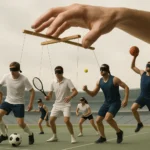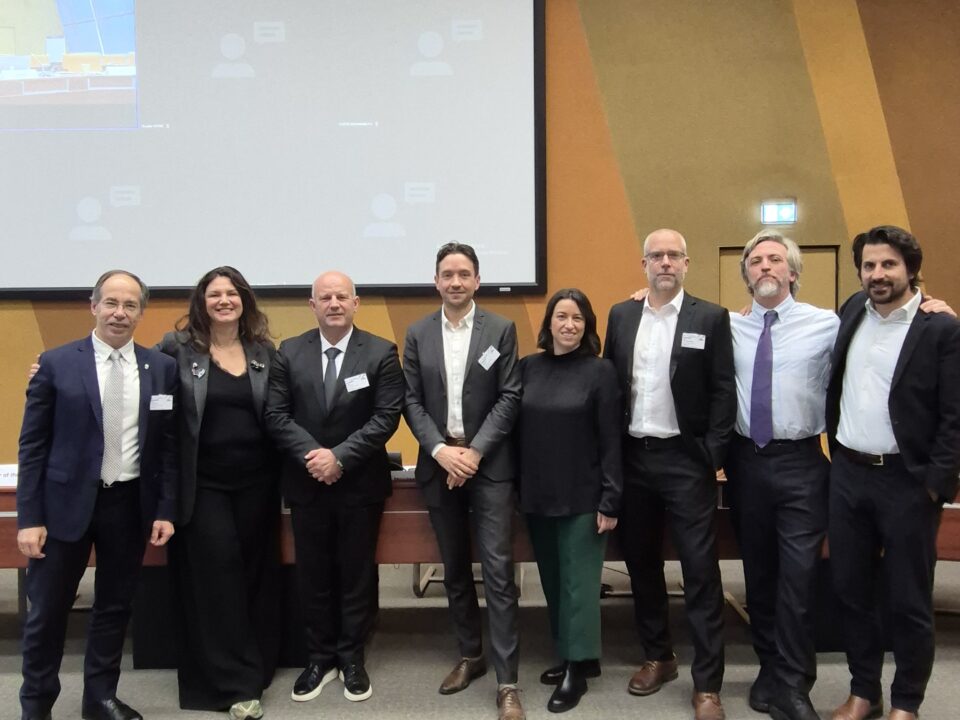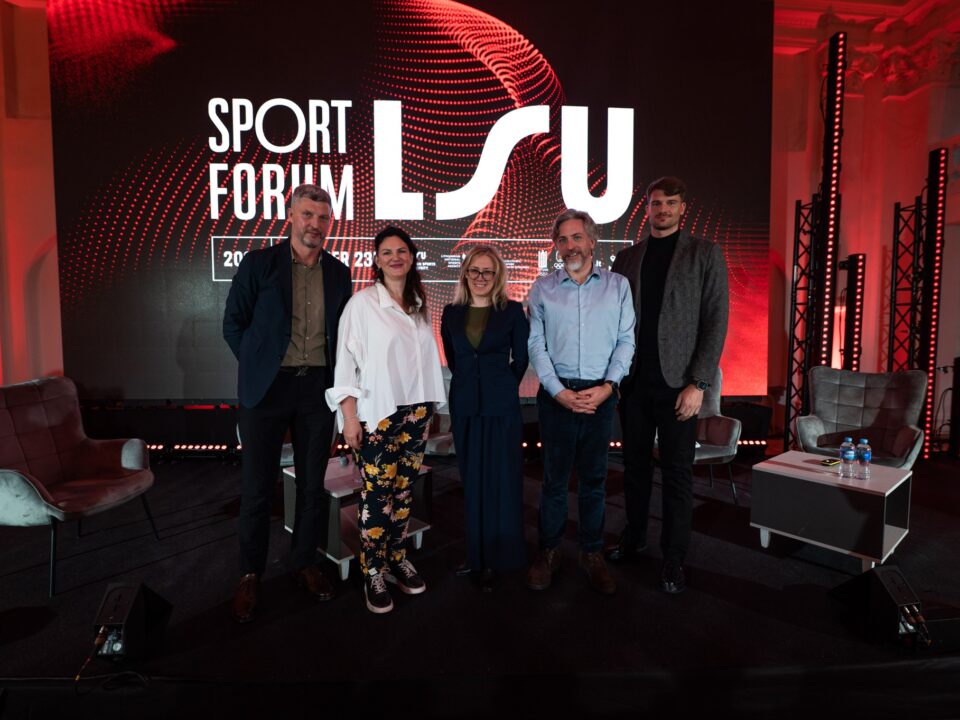Ratification of the Council of Europe Convention on the manipulation of sports competitions
2024-06-20
More than 1,000 suspicious sports matches and meetings worldwide per year
2025-03-04Last week, the final event of the "Dietary Supplement Risks" project took place. The project brought together organisations from different parts of the country for a joint conference, not only to share their experiences on dietary supplements, but also to find new ways to improve public knowledge on responsible consumption of dietary supplements.
This project is an example of cooperation between the Lithuanian Anti-Doping Agency and UNESCO. This is the second project funded by the Foundation.
"We are very pleased to complete the second successful project of the Lithuanian Anti-Doping Agency, which was funded by UNESCO. The use of food supplements is an important topic and we are pleased to have contributed to it," said Miglė Mašanauskienė, Secretary General of the Lithuanian National Commission for UNESCO, about the project.
Despite the fact that dietary supplements are finding a growing audience both in Lithuania and worldwide, the topic is rarely in the spotlight in our country. This is why the Lithuanian Anti-Doping Agency, as part of a UNESCO-funded project, has teamed up with a number of organisations in the country to improve the public's knowledge of dietary supplements and the potential risks of taking them.
Dietary supplements are in many people's diets. They are often taken even when not prescribed by a doctor. The frequent advertising of supplements on the internet and in the press is shaping the growing consumer engagement and the observed increase in the popularity of supplements around the world.
"Dietary supplements are a little-discussed topic in Lithuania. This should not be the case, as it is a USD 182.6 billion market worldwide. What we want most in this project is continuity: that this is not a one-day initiative. We want the issue of dietary supplements to be more prominent and visible", said Rūta Banytė, Head of the Lithuanian Anti-Doping Agency.
The benefits of supplements are not always visible
The results of the study commissioned by the Lithuanian Anti-Doping Agency showed similar results to a previous study conducted in Germany. The study found that 40-70% of athletes use dietary supplements. Most of them take more than one supplement, and there are also cases where double-digit amounts of different supplements are taken.
Do dietary supplements guarantee better results? R. Banytė doubts it, using the example of Lithuanian sport.
"We had a case where one athlete, when filling in a doping control form, indicated during the doping control that he had taken 26 different supplements. We decided to compare whether the number of supplements taken leads to high performance. It turned out that another athlete who does not take supplements won a gold medal at the World Championships," said the head of the Lithuanian Anti-Doping Agency.
If large quantities of dietary supplements do not guarantee results, what are the risks of taking them? According to various studies, between 12 and 25 percent of food supplements are contaminated. It is possible to find banned substances in them. Sometimes the amount is not enough to penalise an athlete who uses contaminated supplements, but even in Lithuania there have been cases where such supplements have not only led to disqualification, but have also damaged the athlete's reputation and caused additional problems.
Penalties for using contaminated supplements in Lithuania
It is the responsibility of the athletes themselves to check what supplements they take. Usually, top-class professionals are careful about what they supplement their diet with, but sometimes it's easier than many people think to step on the rake.
Sometimes banned substances can also be found in food supplements that are widely advertised to the public. A supplement promoted as a "miracle" weight-loss product by well-known public figures in Lithuania came as an unpleasant surprise to an athlete who believed in it.
"We had a case where an athlete was tempted by a widely advertised weight-loss supplement. However, she started to feel uncomfortable after taking them and decided to stop after just three pills. Nevertheless, just three pills led to a positive doping test. After winning the competition, sibutramine, an anorexic drug removed from the banned list, was found in her system and was found in her system when she was taking these pills," said Erika Petrutytė, a lawyer at the Lithuanian Anti-Doping Agency, about the fine line of supplementation.
Doing your homework is essential to reduce the risk of buying contaminated supplements. Sometimes it is enough to check with suppliers, using Google search, typing in the keywords "doping" or "WADA" next to the supplement, but sometimes even all efforts to protect yourself are fruitless.
Contaminated supplement - reputation ruined forever
Zita Kosač, a runner, decided to share her unpleasant experience with food supplements at the conference. She was stunned when she received the news after a marathon that she had tested positive for doping. Finally, she managed to achieve what most athletes fail to do - prove that contaminated supplements are to blame.
"When the news reached me that anabolic steroids had been found in my sample, I couldn't understand how it happened and what it meant. At first it seemed a bit funny because I knew I hadn't done anything like that, but I soon realised it was very serious. I was shocked and for three days I could not believe it. I had to analyse what I had been eating for a year and I had all sorts of thoughts: maybe someone had fed me contaminated food? Maybe I drank water that was specially contaminated? It was a completely new experience," said the athlete.
Eventually, tests revealed that the amino acids consumed by the athlete were contaminated. Although the supplement was bought from a physical store where many professional athletes shop, this did not ensure that the substances reaching her were clean.
Proving that the supplements were contaminated was also not easy. According to Ms Kosač, patience and hope were required in dealing with the responsible authorities and in finding ways to test the supplements. Sometimes it took weeks to get answers. Finally, the green light was given to investigate the suspect supplements.
"The supplements I took contained all the substances found in my sample, and to a lesser extent, but the same substances were found in the unopened package," said the athlete.
Proof that the illegal substances were in her system due to contaminated supplements did not absolve the athlete of responsibility. However, she was given a reduced sanction of 6 months of disqualification. She had an even more difficult time trying to hold the manufacturers and suppliers responsible for the production and supply of contaminated supplements.
"When the representative of the shop where I bought the supplements found out about the contamination, he pretended that he didn't sell them at all. Good thing I had all the proof I needed to prove that I bought them there, so he finally had to admit his mistake and pay the fine. I made my own mistake in dealing with the manufacturers. I contacted them earlier, so they had time to 'clean up' and prepare for possible inspections. However, I couldn't have sued them anyway, because legal proceedings cost a lot of money and I had to spend my own money on investigations and other things."
Damaging not only to your reputation but also to your body
The disqualification was not the end of Kosač's troubles due to a positive doping test. Even after proving that the doping in her system was not her fault and serving the penalty, she still faces the stigma of being a bystander: "Even now, when you compete and win competitions, they don't want to give you a medal. I hear people say that they can't give me medals. It's painful at the time, but you try to explain what the situation was, that I've already served my time and I don't have any more sanctions, I can compete just like the other athletes."
Another problem is the potential harm to the body when banned substances have entered it. The athlete doesn't hide the fact that this still scares her: "I went to the doctor and we talked about what could happen to my body after these substances entered it. As a girl with no children, this was a very important issue for me and caused me a lot of stress and sleepless nights. I was also in a very bad emotional state, and I was not prepared for the publicity that I was getting. In my case, the situation was made public before I had a chance to prove that the supplements were contaminated. It seems that I was interested in supplements, I was checking, I was choosing the best option, but that was the end of it. I would advise everyone to check as much as possible and to realise that nobody is immune."
Initially reluctant to go public, Z. Kosač decided to share her story to help others avoid such an unpleasant scenario. Her research on supplements and the information she shared with the Lithuanian Anti-Doping Agency about the contaminated supplements sparked a public backlash: the contaminated supplements were immediately removed from all stores selling them in Lithuania. Many people also wondered what harm contaminated supplements could cause to their users.
The project aims to reach as many people as possible with this information
The damage to the body from contaminated supplements is often overlooked by people who are not at risk of doping controls. In the case of amateur athletes, it is noticeable that they are not always interested in the composition of the supplements before they are taken and the possible reactions of the body to contaminated substances.
The Lithuanian Anti-Doping Agency therefore commissioned two studies to investigate the use of supplements among both athletes and members of the public.
"Only 20-30% of people who take supplements question their safety. This is a very small number, though not surprising," Gabija Mikulevičienė, medical manager at the Lithuanian Anti-Doping Agency, said of the study.
"Together with the creative integrated communication agency INK Agency, we wanted to encourage sports people to take a responsible approach to supplements and their necessity before choosing them, to carefully look at their composition and possible side effects, and if they are already taking sports supplements, to look at the label of the supplements they are taking and to analyse their composition. We also aimed to provide as much information as possible. To do this, we used the witty character "Rama Kilogramas", already created by the actor Audrius Bružas, with the slogan "think with your brain, not with your muscles"," Dalia Motejūnaitė, Education Manager of the Lithuanian Anti-Doping Agency, said about the publicity of the project.
Information on supplements has become more widely available online. Athletes, their coaches and staff members, as well as other people can find a lot of useful material on bedopingo.lt.
The public and the sports community had the opportunity to participate in seminars on balanced nutrition for athletes and the choice of dietary supplements, led by Dr Artūras Sujeta and Dr Gabrielė Balčiūnaitė-Murzienė, specialists in their fields. For those who could not join the remote training and are interested in the training, they can find it on the Lithuanian Anti-Doping Agency's Youtube account.
Testing food supplements - a complex process
When buying supplements, the country where you buy them is also important. Often, different countries have different requirements on what substances can be in supplements.
If you decide to buy dietary supplements, it is also worth familiarising yourself with how they end up in the hands of traders. In Lithuania, food supplements are classified as food, and the State Food and Veterinary Service is responsible for their notification.
"In Lithuania, food supplements are notified. But it should be noted that the list of banned substances varies from country to country. As a result, if you buy the same supplements in Lithuania and America, they may contain different ingredients. The risks are particularly high when buying food supplements from third countries," said Ona Keblienė, interim head of the Food Division of the Food and Veterinary Policy Department of the State Food and Veterinary Service.
In Lithuania, the notification of food supplements is carried out by checking that the supplement does not contain substances that are banned in the country. However, with the number of food supplements increasing every year, it is not possible to test the composition of each one. Although the State Food and Veterinary Office carries out inspections to check that only the specified substances are present, a lack of resources does not allow for sufficient analysis to ensure the safety of supplements.
Another problem is the labelling of food supplements. Once a supplement has been certified as safe for use, the manufacturer may release supplements on the market that sometimes have labels that do not correspond to reality. While dietary supplements are being investigated, their packaging sometimes contains misleading claims about effects that the supplement does not have.
For this reason, O. Keblienė advises everyone to personally assess what supplement manufacturers claim: "I would advise you not to believe in fairy tales and to assess the benefits of supplements realistically, without expecting miracles. You won't lose a lot of weight in a week and you won't fix your body in a month. You can only damage it in that amount of time."
Dr Gabrielė Balčiūnaitė-Murzienė, Chief Specialist at the State Medicines Control Authority, also highlighted the differences between medicines and food supplements. According to her, medicines have to go through much more scrutiny and it takes up to 15 years to prove how it works, possible side-effects, etc. In contrast, dietary supplements do not have such high requirements, making them much easier to put on the market.
Coaches and parents interfere in addition to athletes
Sports physicians are probably the most likely to be familiar with the dietary supplements used by athletes. Through blood tests, they can advise on what athletes are deficient in and which supplements would help to address this deficiency.
However, as Paulius Petraitis, interim head of the Sports Medicine Department of the Lithuanian Sports Centre, says, we need to understand that there are two different worlds. While professional athletes have a serious attitude, other amateur athletes are often not even interested in what they are taking.
"We need to understand how much professional sport is different from all other sports on this issue. Professionals understand that they can harm themselves by taking the wrong supplements. While others do not even know what they are taking. I have heard more than one story of a non-professional athlete saying that he is taking what the coach gives him - just a handful of pills that he does not know the name of or how they work. In sports clubs, most people are not interested in what they are taking, which is why they don't give up banned substances," Petraitis said.
Another problem is that it is often not the athletes themselves who decide whether to take a supplement. It is not up to the athletes, but their coaches or parents who buy and sell them the supplements. Very often, they do so without checking whether the athlete really needs the supplement, sometimes just because another athlete is taking it.
Sometimes doping can also be linked to illness. Not all GPs pay attention to what drugs to prescribe for their patients. There are also cases where medicines containing substances considered to be doping are prescribed instead of an alternative that does not contain banned substances.
P. According to Petraitis, sometimes this is due to a lax approach to the issue, and sometimes doctors simply lack knowledge. The list of banned substances changes every year, and in Lithuania, unlike several other countries, the packaging of medicines or their leaflets are not labelled if they contain substances considered to be doping.
How would a sports doctor advise me to choose dietary supplements? Don't expect miracles - usually the supplements with the most visible results are contaminated: "Supplement users need to realise that if there is an effect that you can feel immediately, that supplement is likely to contain something on the doping list. With a clean supplement, you won't feel its effects suddenly. Even if you need it and it helps you, there won't be a big, noticeable difference."
Around the world, the quality of supplements is often ratified and supplements are tested in special laboratories to ensure their purity before they enter the market. However, Mr Petraitis admits that he has not seen any supplements in Lithuania that carry this label.
This project is a model for all the Baltic States and Scandinavia
The UNESCO-funded project "Risks of Dietary Supplements", funded by the Lithuanian Anti-Doping Agency, has already received international recognition. A study of this scale, which would allow the assessment of dietary supplement consumption and public education, has not been carried out in the other Baltic States or Scandinavia.
"What impressed me most about this project was the research. It is remarkable that so many people and athletes were interviewed. I would love to see other Baltic countries or Scandinavians do the same projects with this kind of research. The way in which this study was carried out, the way in which the information was shared and made available to the public is an example for other countries. I have done a lot of tagging myself and I will take a lot of information back with me," said Jukka Koskelo from Finland, who is evaluating the project, without any compliments.
In Lithuania, the project is expected to take further steps towards making food supplements safer, more informative and reaching more people. Other contributors to the project will also contribute, as they also have ideas and plans to reduce the problems associated with the indiscriminate use of supplements that are not always safe.
How to help people choose supplements? First of all, attention should be paid to those supplements that are mislabelled. Only definitive, validated information should be used on labels and in advertisements to avoid misleading people.
The Lithuanian Anti-Doping Agency will seek even closer cooperation with the State Food and Veterinary Service. Both sides agree that they can help each other and that sharing information can provide more and more accurate information to consumers of food supplements.
More cooperation will also be sought with universities that train future doctors. Introducing them to banned substances could provide useful information that they can then pass on to patients and use in practice.
However, education will continue to be the most important weapon in the fight against dietary supplement risks. We will continue to provide seminars, training and to encourage the public to pay attention to what they consume - to "think with their brains and not their brawn" - not only for athletes and the sporting community, but also for the whole of society.





